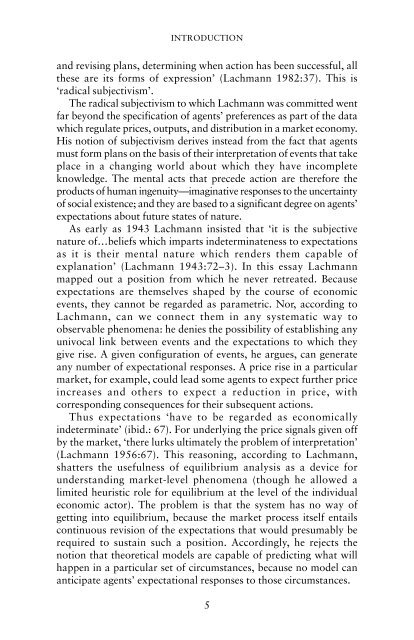Subjectivism and Economic Analysis: Essays in memory of Ludwig ...
Subjectivism and Economic Analysis: Essays in memory of Ludwig ...
Subjectivism and Economic Analysis: Essays in memory of Ludwig ...
You also want an ePaper? Increase the reach of your titles
YUMPU automatically turns print PDFs into web optimized ePapers that Google loves.
INTRODUCTION<strong>and</strong> revis<strong>in</strong>g plans, determ<strong>in</strong><strong>in</strong>g when action has been successful, allthese are its forms <strong>of</strong> expression’ (Lachmann 1982:37). This is‘radical subjectivism’.The radical subjectivism to which Lachmann was committed wentfar beyond the specification <strong>of</strong> agents’ preferences as part <strong>of</strong> the datawhich regulate prices, outputs, <strong>and</strong> distribution <strong>in</strong> a market economy.His notion <strong>of</strong> subjectivism derives <strong>in</strong>stead from the fact that agentsmust form plans on the basis <strong>of</strong> their <strong>in</strong>terpretation <strong>of</strong> events that takeplace <strong>in</strong> a chang<strong>in</strong>g world about which they have <strong>in</strong>completeknowledge. The mental acts that precede action are therefore theproducts <strong>of</strong> human <strong>in</strong>genuity—imag<strong>in</strong>ative responses to the uncerta<strong>in</strong>ty<strong>of</strong> social existence; <strong>and</strong> they are based to a significant degree on agents’expectations about future states <strong>of</strong> nature.As early as 1943 Lachmann <strong>in</strong>sisted that ‘it is the subjectivenature <strong>of</strong>…beliefs which imparts <strong>in</strong>determ<strong>in</strong>ateness to expectationsas it is their mental nature which renders them capable <strong>of</strong>explanation’ (Lachmann 1943:72–3). In this essay Lachmannmapped out a position from which he never retreated. Becauseexpectations are themselves shaped by the course <strong>of</strong> economicevents, they cannot be regarded as parametric. Nor, accord<strong>in</strong>g toLachmann, can we connect them <strong>in</strong> any systematic way toobservable phenomena: he denies the possibility <strong>of</strong> establish<strong>in</strong>g anyunivocal l<strong>in</strong>k between events <strong>and</strong> the expectations to which theygive rise. A given configuration <strong>of</strong> events, he argues, can generateany number <strong>of</strong> expectational responses. A price rise <strong>in</strong> a particularmarket, for example, could lead some agents to expect further price<strong>in</strong>creases <strong>and</strong> others to expect a reduction <strong>in</strong> price, withcorrespond<strong>in</strong>g consequences for their subsequent actions.Thus expectations ‘have to be regarded as economically<strong>in</strong>determ<strong>in</strong>ate’ (ibid.: 67). For underly<strong>in</strong>g the price signals given <strong>of</strong>fby the market, ‘there lurks ultimately the problem <strong>of</strong> <strong>in</strong>terpretation’(Lachmann 1956:67). This reason<strong>in</strong>g, accord<strong>in</strong>g to Lachmann,shatters the usefulness <strong>of</strong> equilibrium analysis as a device forunderst<strong>and</strong><strong>in</strong>g market-level phenomena (though he allowed alimited heuristic role for equilibrium at the level <strong>of</strong> the <strong>in</strong>dividualeconomic actor). The problem is that the system has no way <strong>of</strong>gett<strong>in</strong>g <strong>in</strong>to equilibrium, because the market process itself entailscont<strong>in</strong>uous revision <strong>of</strong> the expectations that would presumably berequired to susta<strong>in</strong> such a position. Accord<strong>in</strong>gly, he rejects thenotion that theoretical models are capable <strong>of</strong> predict<strong>in</strong>g what willhappen <strong>in</strong> a particular set <strong>of</strong> circumstances, because no model cananticipate agents’ expectational responses to those circumstances.5

















